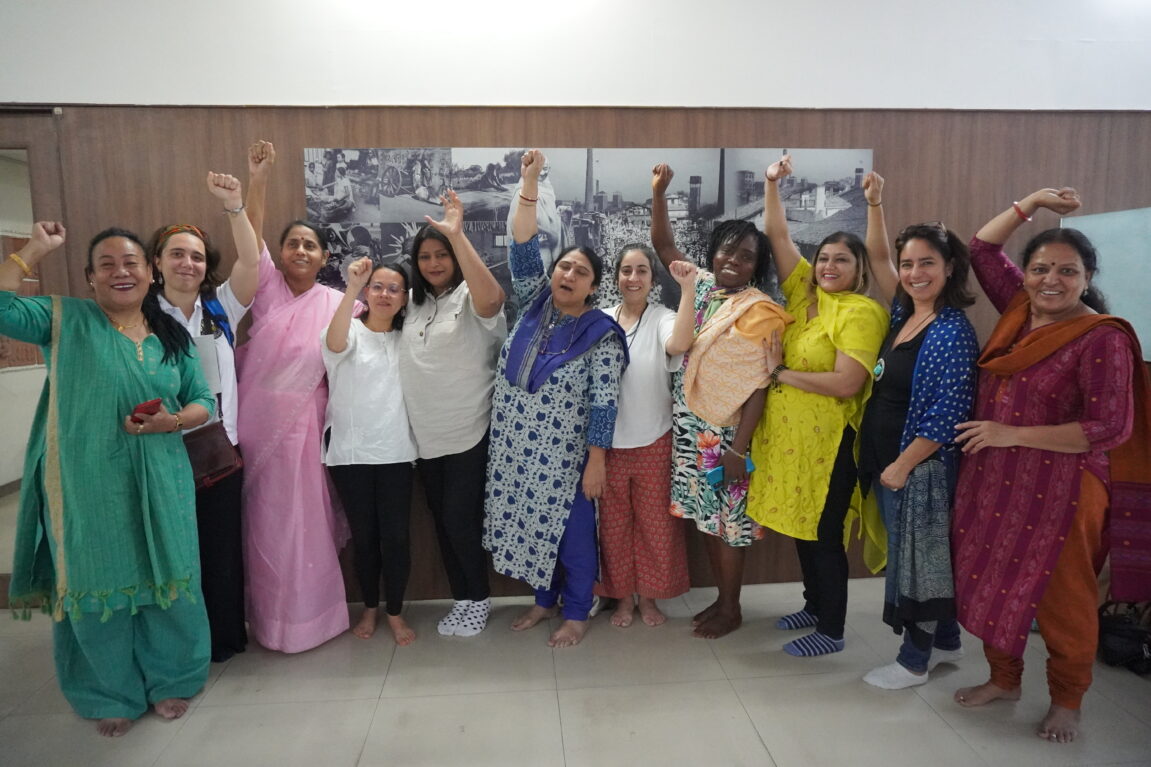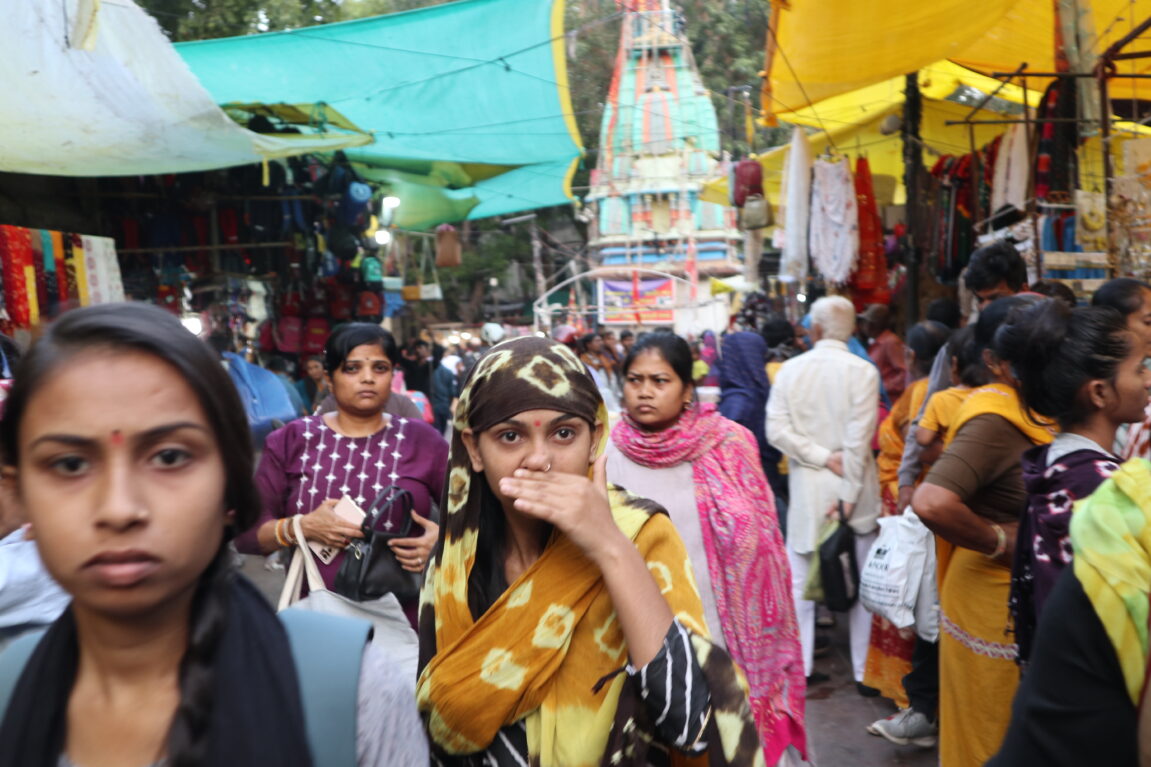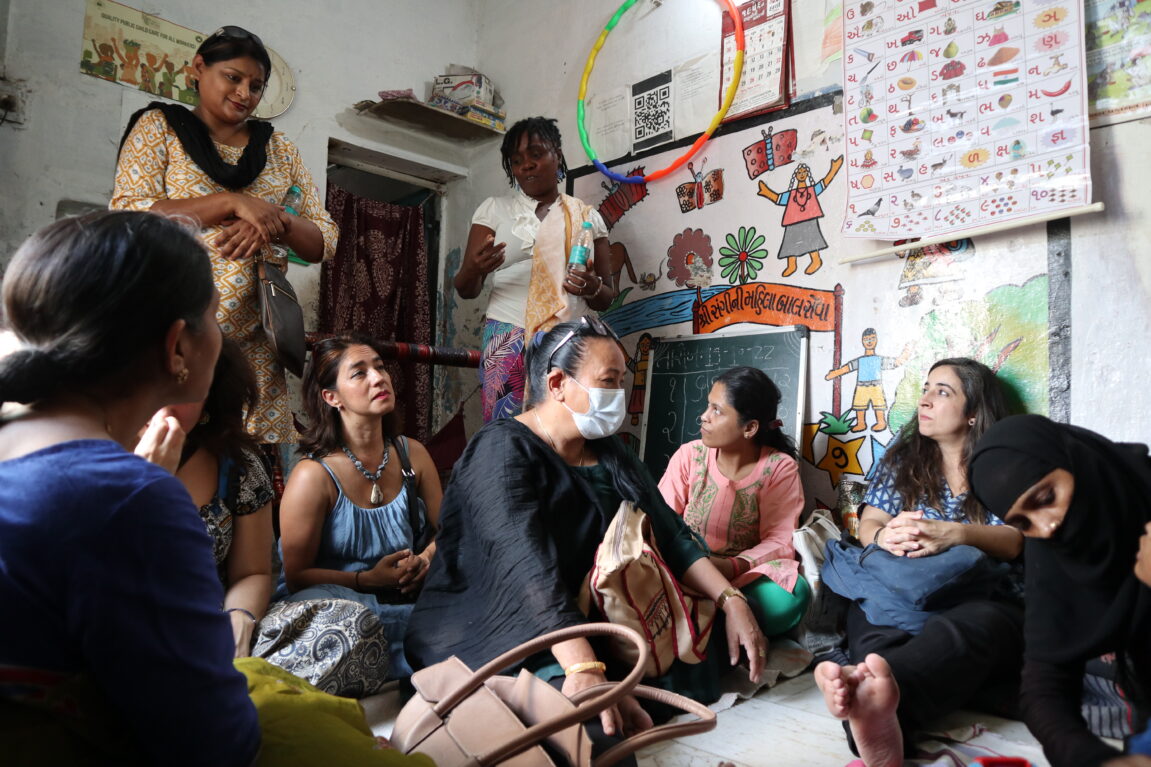Subscribe to our E-Letter!
Subscribe to our e-mail and stay up-to-date with news and resources from street vendors around the world.
From 14th to 19th October, the StreetNet team gathered in Ahmedabad, India, for a four-day visit to the Self Employed Women’s Association Academy (SEWA). We were happy to be accompanied by Maya Gurung, president of NEST (Nepal) and Member of the International Council. The goal of the visit was to be exposed to the activities of SEWA, learn about their philosophy and history, and to meet with the workers and their families, street and market vendors, who have benefited from the work of SEWA over the decades. Our visit focused primarily on the work of the Indian Academy of Self-Employed Women, or IASEW, is an educational institution devoted to improving the life, capacity and to empower women in the informal economy – the majority of the female workforce in India. Through an active and participatory approach, IASEW teaches women and girls about political leadership, health, society, environment and empowers them to create meaningful change in their community.
SEWA has also been one of the founding members and driving forces behind the creation of StreetNet in 2002.
“This trip has been so meaningful for StreetNet” says Maìra Vannucchi, StreetNet regional organiser for Americas. “We can see how much of SEWA is essential for the existence of StreetNet. They have managed to develop a strategy for unionisation that is really effective, benign a 50 years-long work”.
Now SEWA is working also to make its meaningful experience known outside the borders of India. Sapna Raval, one of the program managers at IASEW and our guide through the experience, added: “We value the national perspective as well as the international level. We want the experience of our people to reach the outside world. This is why we organise these kinds of visits: to give knowledge about our work to other people”.

Born in 1972, in the wake of the Gandhian liberation movement, SEWA was first to organize woman workers in the area of Ahmedabad, who lost their job in the textile industry, after the economic crisis. These women, being among the most vulnerable workers, were pushed out of formal employment and started their own small businesses in the informal sector.
SEWA has grown enormously in the past fifty years: it has evolved from a local trade union to an organisation respected and known at international level . It has many core activities dedicated to improving the livelihoods of the women workers such as the SEWA Bank, which offers credit and saving opportunities for the poorest workers in the country, the SEWA Cooperative Federation, that fosters and supports cooperative businesses founded by informal economy workers and numerous community centres operating in the field of child care, health education and reproductive rights.
During the field visits, we had the opportunity to talk directly to the workers and learn about the impact of SEWA’s activities on their livelihoods. Walking through the Plaza market in Ahmedabad together with our guides (Reema Kapoor and Sapna Raval, program directors of the Academy), many people recognised the SEWA delegation and expressed their gratitude. “Thanks to SEWA, I’m able to conduct my business in peace, without anybody harassing me,” said one woman vendor. Another woman told us proudly that she is able to save up to send her children to school, even though she had to start vending in the street very early in life. Some vendors have been members of SEWA for over twenty years. “I used to have a lot of problems with the police,” another vendor told us. “I used to run to SEWA offices to ask for help”. The same woman told us that she was able to obtain a loan from SEWA bank to buy raw materials for her business.
In the bank, we witnessed the educational work that the SEWA officials and employees have done in giving workers a thorough financial education: they have taught them how to make a saving plan, how to ask for a loan, how to operate an ATM and a debit card.
“I have been a member of the SEWA bank for the past 15 years,” one customer told us. “I have been saving in this bank. I am a domestic worker”. For many informal economy workers it is almost impossible to obtain financial assistance or credit. “Here, it is easy and accessible,” the client explained.
On the third day, we visited a literacy program for adult women, another activity SEWA takes great pride in organising. In this case, too, the workers were very eager to tell us about the benefits of joining the union and undertake such a course. A woman said she is now able to read indications in the hospital, another one stated that now she can help her children with their homework. Many of them stressed how literacy has helped them in their day to day business: workers are able to keep a registry and do calculations, to better communicate with customers. For women working in the textile industry, knowing basic maths is essential to do measurements.
“It has been so enlightening to see the work of SEWA and its benefit for workers” says Evelyn Benjamin-Sampson, StreetNet’s organiser for West and Central Africa. “I have written my master thesis on informal economy, but this trip has added so many practical perspectives to my knowledge”.

The association works on two main levels: the struggle for labour rights and economic development, always with a focus on women. The struggle side is led by the workers’ union. The workers’ union negotiates with authorities, pushes for better legislation and represents the workers in official contexts. The cooperative federation supports workers in their business and daily work, both financially and through entrepreneurial education and capacity building.
SEWA’s principles (equality, non violence, women’s rights and peaceful cohabitation among different cultures and religions) are known and applied in different activities and at different levels of the organisation. From research and communication to workers’ education, all the people we have met and spoken to seem to understand very clearly the missions and values of the organisation.
Organising is one of the main pillars of all the activities in SEWA: people need to be mobilised, included in collective action that is led by self-employed women themselves. This is a long work, a work which took SEWA several decades to develop and many challenges to overcome. Especially since the workers’ base is so diverse, composed of urban and rural women, women from different sectors, religions, chastes and geographical backgrounds, from different generations. SEWA works a lot at the community level, building on trust: people who work in the health or literacy centres, people who work at the bank, who need to collect the money from the customer, teachers at the childcare centres – all of them originate from the communities they serve. Organising would not be possible without this kind of grassroot trust built from below. Staff in the organisation are constantly talking to people on the ground, constantly aware of their needs.
“We have realised how much the economic development and the unionisation are two essential pillars for the emancipation of workers” continues Maira Vannucchi “Creating cooperatives for income generation is a way to combat poverty in a collective way, and to encourage people to speak about their conditions, and fight for their rights”.
Collective action is a key element in SEWA’s philosophy, but it is also coupled with self-reliance. Financial autonomy, decent work as a key to decent life, literacy and negotiation capabilities are all elements that are promoted by the organisation – in the context of social solidarity economy. The people we spoke with underlined this many times: SEWA is not a charity, it is a workers’ organisation that supports women workers in particular and promotes their independence and self-reliance. For example, cooperative businesses are supported by the SEWA cooperative federation for the first two years, but then they become independent and need to be self-sufficient.
“It is incredible to see how many women who were street vendors before now work as employees of SEWA. They were locked in the poverty trap, but thanks to the association, they have been able to improve their lives. It is incredibly inspiring to see, for our work as organisers” comments Nash Tysmans, regional organiser for Asia.

SEWA is a women’s association, and one of its main goals is women empowerment and promotion of women’s leadership. Empowerment is often an overused word, but SEWA has been able to give it a concrete meaning. Women in India and all over the world, and in particular women informal economy workers, are subject to patriarchal structures that do not recognise them as “real workers”: the first step to organising women is to create confidence in them about their role first and their potential second. Empowerment comes from different sources and activity: from learning, to building capacity as leaders, to running community media or cooperatives. SEWA also runs professional education centres for teenage girls, where they can acquire skills to become independent in the future. It’s not only limited to young girls, as many of the students in the literacy class are older women.
“Sewa has done a very appreciable job,” says StreetNet International Council Member Maya Gurung, “Especially by targeting women working in every labour field, organising them, protecting their profession, providing them with training, developing their abilities, making them financially strong, and undertaking various activities”.
“This type of exposure visits are really important” concludes Reema Kapoor, who designed the program we followed and accompanied us, together with Sapna Raval, for the whole five days of our stay. “We can share what we are learning, and we are happy to see our knowledge brought to the outside world”.

By entering your personal data and clicking “Suscribe,” you agree that this form will be processed in accordance with our privacy policy. If you checked one of the boxes above, you also agree to receive updates from the StreetNet International about our work